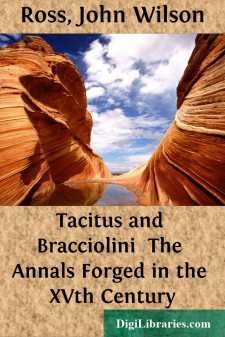Categories
- Antiques & Collectibles 13
- Architecture 36
- Art 48
- Bibles 22
- Biography & Autobiography 813
- Body, Mind & Spirit 142
- Business & Economics 28
- Children's Books 17
- Children's Fiction 14
- Computers 4
- Cooking 94
- Crafts & Hobbies 4
- Drama 346
- Education 46
- Family & Relationships 57
- Fiction 11829
- Games 19
- Gardening 17
- Health & Fitness 34
- History 1377
- House & Home 1
- Humor 147
- Juvenile Fiction 1873
- Juvenile Nonfiction 202
- Language Arts & Disciplines 88
- Law 16
- Literary Collections 686
- Literary Criticism 179
- Mathematics 13
- Medical 41
- Music 40
- Nature 179
- Non-Classifiable 1768
- Performing Arts 7
- Periodicals 1453
- Philosophy 64
- Photography 2
- Poetry 896
- Political Science 203
- Psychology 42
- Reference 154
- Religion 513
- Science 126
- Self-Help 84
- Social Science 81
- Sports & Recreation 34
- Study Aids 3
- Technology & Engineering 59
- Transportation 23
- Travel 463
- True Crime 29
Tacitus and Bracciolini The Annals Forged in the XVth Century
by: John Wilson Ross
Description:
Excerpt
CHAPTER I.
TACITUS COULD BARELY HAVE WRITTEN THE ANNALS.
I. From the chronological point of view.—II. The silence preserved about that work by all writers till the fifteenth century.—III. The age of the MSS. containing the Annals.
I. The Annals and the History of Tacitus are like two houses in ruins: dismantled of their original proportions they perpetuate the splendour of Roman historiography, as the crumbling remnants of the Coliseum preserve from oblivion the magnificence of Roman architecture. Some of the subtlest intellects, keen in criticism and expert in scholarship, have, for centuries, endeavoured with considerable pains, though not with success in every instance, to free the imperfect pieces from difficulties, as the priesthood of the Quindecimvirs, generation after generation, assiduously, yet vainly, strove to clear from perplexities the mutilated books of the Sibyls. I purpose to bring,—parodying a passage of the good Sieur Chanvallon,—not freestone and marble for their restoration, but a critical hammer to knock down the loose bricks that, for more than four centuries, have shown large holes in several places.
Tacitus is raised by his genius to a height, which lifts him above the reach of the critic. He shines in the firmament of letters like a sun before whose lustre all, Parsee-like, bow down in worship. Preceding generations have read him with reverence and admiration: as one of the greatest masters of history, he must continue to be so read. But though neither praise nor censure can exalt or impair his fame, truth and justice call for a passionless inquiry into the nature and character of works presenting such difference in structure, and such contradictions in a variety of matters as the History and the Annals.
The belief is general that Tacitus wrote Roman history in the retrograde order, in which Hume wrote the History of England. Why Hume pursued that method is obvious: eager to gain fame in letters,—seeing his opportunity by supplying a good History of England,—knowing how interest attaches to times near us while all but absence of sympathy accompanies those that are remote,—and meaning to exclude from his plan the incompleted dynasty under which he lived,—he commenced with the House of Stuart, continued with that of Tudor, and finished with the remaining portion from the Roman Invasion to the Accession of Henry VII. But why Tacitus should have decided in favour of the inverse of chronological order is by no means clear. He could not have been actuated by any of the motives which influenced Hume. Rome, with respect to her history, was not in the position that England was, with respect to hers, in the middle of the last century. All the remarkable occurrences during the 820 years from her Foundation to the office of Emperor ceasing as the inheritance of the Julian Family on the death of Nero, had been recorded by many writers that rendered needless the further labours of the historian. Tacitus states this at the commencement of his history, and as a reason why he began that work with the accession of Galba: "Initium mihi operis Servius Galba iterum, Titus Vinius consules erunt; nam post conditam urbem, octingentos et viginti prioris aevi annos multi auctores retulerunt." (Hist....


